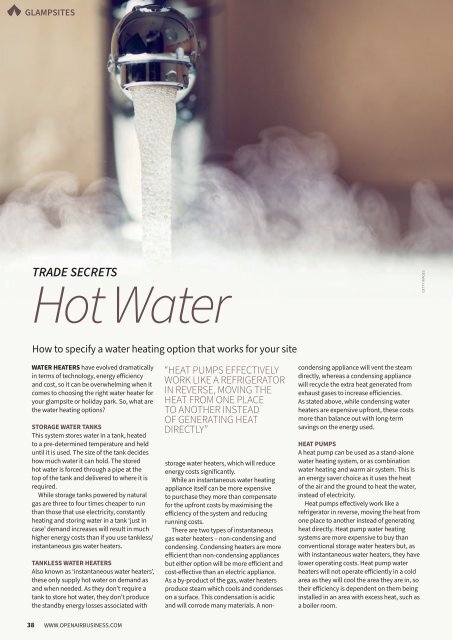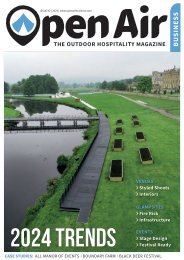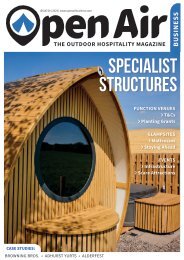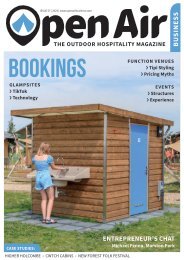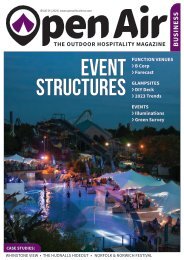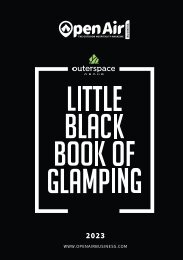Issue 50
The UK's outdoor hospitality business magazine for function venues, glamping, festivals and outdoor events
The UK's outdoor hospitality business magazine for function venues, glamping, festivals and outdoor events
Create successful ePaper yourself
Turn your PDF publications into a flip-book with our unique Google optimized e-Paper software.
GLAMPSITES<br />
TRADE SECRETS<br />
Hot Water<br />
GETTY IMAGES<br />
How to specify a water heating option that works for your site<br />
WATER HEATERS have evolved dramatically<br />
in terms of technology, energy efficiency<br />
and cost, so it can be overwhelming when it<br />
comes to choosing the right water heater for<br />
your glampsite or holiday park. So, what are<br />
the water heating options?<br />
STORAGE WATER TANKS<br />
This system stores water in a tank, heated<br />
to a pre-determined temperature and held<br />
until it is used. The size of the tank decides<br />
how much water it can hold. The stored<br />
hot water is forced through a pipe at the<br />
top of the tank and delivered to where it is<br />
required.<br />
While storage tanks powered by natural<br />
gas are three to four times cheaper to run<br />
than those that use electricity, constantly<br />
heating and storing water in a tank ‘just in<br />
case’ demand increases will result in much<br />
higher energy costs than if you use tankless/<br />
instantaneous gas water heaters.<br />
TANKLESS WATER HEATERS<br />
Also known as ‘instantaneous water heaters’,<br />
these only supply hot water on demand as<br />
and when needed. As they don’t require a<br />
tank to store hot water, they don’t produce<br />
the standby energy losses associated with<br />
“HEAT PUMPS EFFECTIVELY<br />
WORK LIKE A REFRIGERATOR<br />
IN REVERSE, MOVING THE<br />
HEAT FROM ONE PLACE<br />
TO ANOTHER INSTEAD<br />
OF GENERATING HEAT<br />
DIRECTLY”<br />
storage water heaters, which will reduce<br />
energy costs significantly.<br />
While an instantaneous water heating<br />
appliance itself can be more expensive<br />
to purchase they more than compensate<br />
for the upfront costs by maximising the<br />
efficiency of the system and reducing<br />
running costs.<br />
There are two types of instantaneous<br />
gas water heaters – non-condensing and<br />
condensing. Condensing heaters are more<br />
efficient than non-condensing appliances<br />
but either option will be more efficient and<br />
cost-effective than an electric appliance.<br />
As a by-product of the gas, water heaters<br />
produce steam which cools and condenses<br />
on a surface. This condensation is acidic<br />
and will corrode many materials. A noncondensing<br />
appliance will vent the steam<br />
directly, whereas a condensing appliance<br />
will recycle the extra heat generated from<br />
exhaust gases to increase efficiencies.<br />
As stated above, while condensing water<br />
heaters are expensive upfront, these costs<br />
more than balance out with long-term<br />
savings on the energy used.<br />
HEAT PUMPS<br />
A heat pump can be used as a stand-alone<br />
water heating system, or as combination<br />
water heating and warm air system. This is<br />
an energy saver choice as it uses the heat<br />
of the air and the ground to heat the water,<br />
instead of electricity.<br />
Heat pumps effectively work like a<br />
refrigerator in reverse, moving the heat from<br />
one place to another instead of generating<br />
heat directly. Heat pump water heating<br />
systems are more expensive to buy than<br />
conventional storage water heaters but, as<br />
with instantaneous water heaters, they have<br />
lower operating costs. Heat pump water<br />
heaters will not operate efficiently in a cold<br />
area as they will cool the area they are in, so<br />
their efficiency is dependent on them being<br />
installed in an area with excess heat, such as<br />
a boiler room.<br />
38 WWW.OPENAIRBUSINESS.COM


